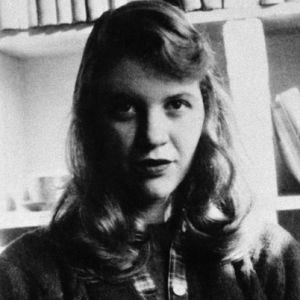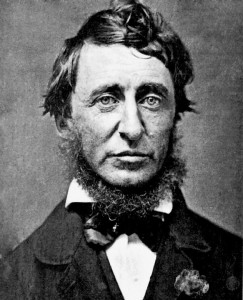While readers tend to focus on Thoreau’s physical removal from society, and his resulting forfeit of easily accessed food, warmth and shelter, I draw larger conclusions from his emotional and mental seclusion. From literature to everyday life, solitude and introspection prove to be cathartic. However, my observations have left me questioning whether or not privacy can have constructive or damaging affects.
Last semester I took a course called the Woman Writer in which we worked with literature through a feminist lens. More so than any other piece, I long-awaited Ariel, a collection of poems by Sylvia Plath, since The Bell Jar has always been a favorite of mine. Anyway, I used to always hold Plath in high regard, because I recognized and respected her not only as a woman and a writer, but also as a victim. Plath was undeniably brilliant, but deeply mot ivated by an urge to please the men in her life: her controlling father, Otto, and her husband, Ted Hughes. As a result, many of her poems capture her resentment of gender roles. One of her poems in particular, ‘The Applicant’ depicts the story of an abrasive salesmen attempting to sell an appliance, a house-wife, to a young man. Sylvia Plath constructed ‘The Applicant’ days after deciding to divorce Ted Hughes, and her poem can be viewed as her disparaging commentary on marriage. In much of her work, Plath illustrates the hardship and inequity of being a woman, and refutes imposed ideals upon women. ‘The Applicant’ is no exception, as it draws upon and challenges a strict social expectation of coupling, and a subservient female role in marriage. Read along and listen here (her voice is eerily captivating).
ivated by an urge to please the men in her life: her controlling father, Otto, and her husband, Ted Hughes. As a result, many of her poems capture her resentment of gender roles. One of her poems in particular, ‘The Applicant’ depicts the story of an abrasive salesmen attempting to sell an appliance, a house-wife, to a young man. Sylvia Plath constructed ‘The Applicant’ days after deciding to divorce Ted Hughes, and her poem can be viewed as her disparaging commentary on marriage. In much of her work, Plath illustrates the hardship and inequity of being a woman, and refutes imposed ideals upon women. ‘The Applicant’ is no exception, as it draws upon and challenges a strict social expectation of coupling, and a subservient female role in marriage. Read along and listen here (her voice is eerily captivating).
Although I commend Plath for her stance against gender conventions, the more I have studied Plath, and the more I read up on her, the less enamored I become. Given her powerful yet disturbing writing, the tumultuous relationships which she herself formed, and her horrific suicide, I am left questioning, which was more valuable to Plath, her art or her life?
I have never thought to limit her work, or her life for that matter, to her mental illness. For this reason, I am left feeling disappointed with Sylvia Plath. I believe that her writing became so reliant on her pain and suffering, that she made no attempt at treatment. As a woman living in the 21st century, perhaps my critique of her is too harsh, but after reading a great deal of her work I can confirm that it does not extend beyond censure of the patriarchy and her struggles as a woman. Al Alvarez, an English poet, accurately viewed Plath’s self-destructiveness as “the very source of her creative energy. It was, precisely, a source of living energy, of her imaginative, creative power.” It is the nature of artists to incorporate their emotions and muses into their craft. But, Plath’s actual suffering and her work became one in the same. One of Plath’s idols, Virginia Woolf, coined the term “a room of one’s own” in which people of every gender are entitled to be alone, and uninhibited to focus upon themselves. In this state, Woolf believed that people could emerge stronger and more independent. I think that Plath found a room of her own, and locked herself inside of it forever.
Thoreau resembles Plath in his commitment to solitude. He has literally created a roo m, a cabin, of his own in which he can dwell and learn to live deliberately, without contact from his superficial world. Like Plath, Thoreau seeks to gain vision, and to be able to share his experience with others. However, there is a great distinction to be made between the two. Thoreau removed himself from the world to pursue his passion, Transcendentalism. Plath isolated herself, detached herself from reality and ignored the well being of herself and her children. She became so obsessed with her work that she allowed herself to fall deeper into her pit of despair. It is a heart wrenching happening that Plath succumbed to her madness, while Thoreau led a liberating existence by combining his art with his life. In being driven by their burning passions, geniuses are rarely able to strike a balance between the two.
m, a cabin, of his own in which he can dwell and learn to live deliberately, without contact from his superficial world. Like Plath, Thoreau seeks to gain vision, and to be able to share his experience with others. However, there is a great distinction to be made between the two. Thoreau removed himself from the world to pursue his passion, Transcendentalism. Plath isolated herself, detached herself from reality and ignored the well being of herself and her children. She became so obsessed with her work that she allowed herself to fall deeper into her pit of despair. It is a heart wrenching happening that Plath succumbed to her madness, while Thoreau led a liberating existence by combining his art with his life. In being driven by their burning passions, geniuses are rarely able to strike a balance between the two.
Source: Plath, Sylvia. “The Applicant.” Ariel. New York: Harper-Perennial, 1999. Print.

I am ALL ABOUT this post!! So fascinating and smart. Thoreau was able to choose and tailor his isolation, as well as to leave it at any time. For Plath, Woolf, etc. isolation was both a forced part of their housewife existence, as well as a dream of a place free from patriarchy, where they could freely develop. I think this calls into question the nature of Thoreau’s isolation, or the desire for isolation is any person. It’s kinda problematic, right? TRUE isolation taken to its fullest extent is not what Thoreau had, nor does it seem to be what he would want. He only wanted partial isolation. The real-deal looks a lot more like the depression and frustration of Plath, and nobody is asking for that. And, desiring isolation displays a lack of understanding of what the real-deal looks like, and what it does to people. I’m thinking of a Yellow Wallpaper-esque situation here. To be able to want, receive, and tailor one’s own isolation is privilege. I’m glad you brought this point up Allison!